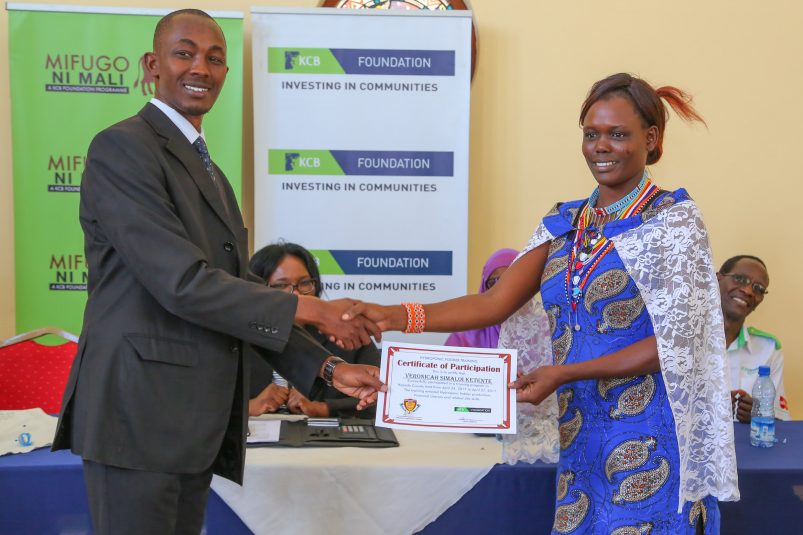Livestock farmers in Kajiado and Narok Counties will now be able to produce fodder for their livestock throughout the year, following training on the adoption of hydroponics agricultural technology for fodder production.
The training, which is an initiative by KCB Foundation through its Mifugo Ni Mali program, in partnership with Master Card Foundation through the MobiGrow project and the County Governments of Kajiado and Narok, targeted 84 trainees drawn from 37 cooperative societies. The long term project is designed to offer a sustainable solution to livestock producers by providing fodder for their animals.
Speaking at the event held in Kajiado County, KCB Foundation, Executive Director, Ms. Jane Mwangi, challenged cooperative societies present to embrace hydroponic technology since during drought periods, cooperatives in the two counties are losing income of up to Ksh 4.6 billion per month.
“Adoption of hydroponic farming will mean that livestock farmers will no longer be controlled by weather conditions because farmers can now grow fodder for their livestock all year round,” said Ms. Mwangi.
The hydroponic livestock fodder project is a climate-sensitive response from the KCB Foundation to improve food and livelihoods security for the communities in Arid and Semi-Arid Lands (ASAL), by securing the fodder situation for their livestock. It involves the germination and subsequent growth of seeds which sprout into a high quality, highly nutritious, disease-free animal food. The fodder replaces grains like dairy meal, pig’s feeds and poultry feed concentrates and is considered the best for animals.
“With hay and grain prices reaching record highs, as well as the drought that has been experienced across the country, there is a need for dependable, affordable and nutritious feed for livestock. Through adopting the hydroponic fodder system, a livestock farmer can cheaply produce daily fodder for his/her animals 365 days a year,” said Ms. Mwangi.
Also present at the event was the Chief Officer In-charge of Livestock in Kajiado County, Leakey Ritei, who pointed out that in order to improve the socio-economic status of the people in the county, concerted efforts and partnerships with other key stakeholders must be sought. This will in turn spur economic growth that is more inclusive, to effectively reduce poverty and create a thriving livestock industry.
Members from both county governments welcomed the move by KCB Foundation to popularize the adoption of hydroponics technology in the county.
“In due course, we intend to have every livestock farmer in Kajiado and Narok Counties take up the use of the hydroponics technology in order to boost livestock production. We thank KCB Foundation for making this possible,” said Mr. Ritei.
Over the course of the project, it is expected that a majority of livestock farmers in the identified ASAL counties will adopt this technology and reduce the overwhelming dependence on rain-fed fodder. KCB Foundation plans to roll out the project in 10 counties by the end of the year. So far, at least 200 farmers have recently undergone similar training in Marsabit County.



